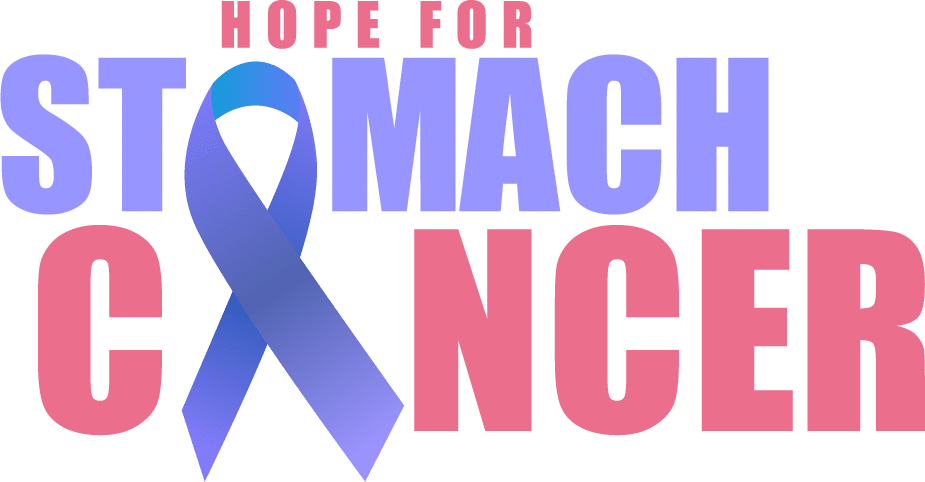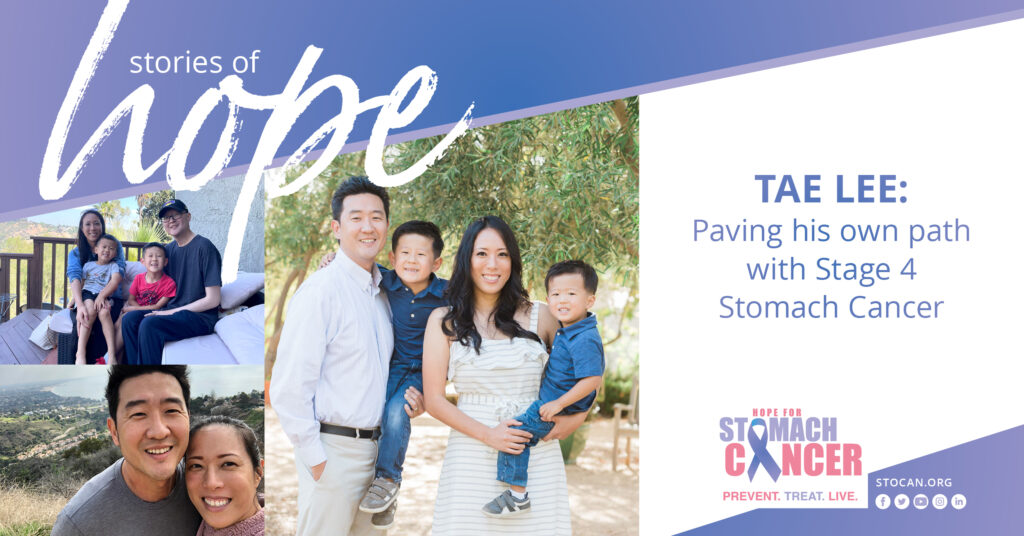Emi Lee recounts her husband Tae’s story of his almost three-year-long battle with stomach cancer. Diagnosed with stage four gastric cancer, Tae dedicated himself to fighting this disease and faced each new challenge with optimism, hope, and grace. This is his story of bravery and perseverance.
Q: Emi, thank you for being willing to share Tae’s inspiring story with us. Can you please explain how he received his stage 4 stomach cancer diagnosis?
A: In 2019, Tae and I lived in the Santa Monica area of Los Angeles with our sons Nolan (4) and Miles (2). Tae was 38 years old. He was the COO of an up-and-coming tech company after he had sold his own start-up a year earlier.
Though he had a successful career in different leadership roles, his favorite role that brought him the most joy was being a father to his boys. In the summer of 2019, Tae went to see his primary care doctor for some minor stomach pains and bloating. He was prescribed some antacids, which temporarily masked his symptoms.
Discovering Stage 4 Stomach Cancer
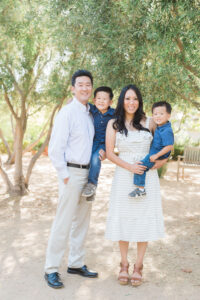 By November, the pain had moved toward his lower stomach. He returned to his doctor and scheduled an endoscopy for late December. The endoscopy showed an ulcer in Tae’s stomach, and at the time, we thought that was the only issue. When the biopsy came back positive for stomach cancer on December 23rd, we were completely shocked. He was otherwise healthy and had no symptoms besides minor stomach pain.
By November, the pain had moved toward his lower stomach. He returned to his doctor and scheduled an endoscopy for late December. The endoscopy showed an ulcer in Tae’s stomach, and at the time, we thought that was the only issue. When the biopsy came back positive for stomach cancer on December 23rd, we were completely shocked. He was otherwise healthy and had no symptoms besides minor stomach pain.
On Christmas Eve, Tae walked into the radiology center and pleaded with the nurse to fit him in for a CT scan so that he could find out what stage he was at. We were devastated to learn right after Christmas that he had stage 4 stomach cancer. The radiology report showed that the cancer had spread to his peritoneum, which is the lining that surrounds the abdominal organs.
A Committed Fighter
Despite the grim survival statistics for stage 4 stomach cancer (6% 5-year survival, and even lower for his type – diffuse signet ring cell with peritoneal metastasis), Tae was hell-bent on being one of the survivors. No matter what it took, he wanted to see his two boys grow up.
He was always an optimist and had so much hope, determination, and confidence that he’d beat all the odds – even if it took a miracle. Tae had a huge army of supporters. This group included friends, classmates from Stanford Business School, and co-workers past and present who wanted to help him and our family in any way possible.
He created a WhatsApp group for his supporters (about 200 people) called “Beat Cancer with Tae.” He gave frequent updates on his treatment and health, asked for help or advice, and received a tremendous amount of love, moral support, and encouragement for the fight of his life. His positivity and unrelenting fighting spirit were inspirational to the group. Their support helped give him the strength to keep fighting against all odds.
Q: It’s wonderful to hear that Tae had so much support after receiving this shocking diagnosis. What did doctors recommend as his treatment plan?
A: Tae quickly went into research and networking mode to learn about and get connected to the best gastric cancer doctors in the US and Asia. He wanted to determine the best course of treatment for his situation.
Within a week after diagnosis, we had 4 appointments with oncologists at different medical institutions in the Los Angeles area. We also had meetings scheduled with the top GI oncologist and surgeon at MD Anderson in Texas. The first doctor we met with gave a grim prognosis of about 12 months for his type of cancer and spread. Undeterred, Tae connected with other top GI oncologists in the US via phone or e-mail so that he could get as many opinions as possible.
In addition, Tae was able to schedule appointments with oncologists and surgeons at the 3 top medical institutions in Korea. Gastric cancer is one of the most common cancers in Korea. The last week of December and the first 2 weeks of January 2020 were a flurry of appointments and travel to Texas and Korea. He was willing to fly anywhere for the best chance at survival. We were hoping for some different options in Korea. However, the doctors there all said that for stage 4 stomach cancer, they would only offer curative surgery if the peritoneal metastasis had a PCI (peritoneal cancer index) score of less than 10. Otherwise, they recommend chemo similar to first-line chemo in the US.
Thinking Outside of the Box
Tae knew that he would have to think beyond the standard of care first-line treatment (FOLFOX or FLOT) for any chance at survival. Through his research and meetings, he learned of a phase 3 clinical trial led by MSK. This trial included a combination of chemo, Herceptin, and Keytruda, which had very positive phase 2 results.
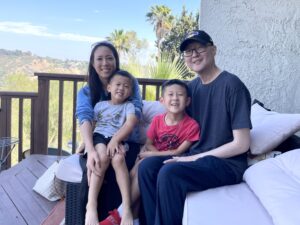 Since his cancer was HER2+ and PD-L1 positive, he decided to take this combination of drugs off-trial (as to not risk being in the placebo group in the trial). The only hurdle was getting insurance approval for Keytruda which was not FDA-approved for first-line at the time. Thankfully, he was able to get compassionate use approval for it.
Since his cancer was HER2+ and PD-L1 positive, he decided to take this combination of drugs off-trial (as to not risk being in the placebo group in the trial). The only hurdle was getting insurance approval for Keytruda which was not FDA-approved for first-line at the time. Thankfully, he was able to get compassionate use approval for it.
Starting Treatments at City of Hope
Tae decided to start his treatment at City of Hope in the Los Angeles area. He then had laparoscopic surgery to determine his PCI score. Sadly, he received a further blow when he found out his cancer had spread to all 4 quadrants of his peritoneum with a PCI of 16. Tae started his first chemo infusion on January 18th 2020, only 3 weeks after diagnosis. He knew he needed to move quickly to fight this aggressive cancer.
His goal was to get the cancer burden in his peritoneum low enough via systemic chemo and targeted therapy, HIPEC (heated intraperitoneal chemotherapy) and/or PIPAC (pressurized intraperitoneal aerosol chemotherapy), to be eligible for a curative gastrectomy.
Tae tried to stay as active as possible to keep his body strong. We would go on hikes in the mountains after chemo and he lifted weights at home. Tae and I joined as many online support groups as possible to learn everything we could about his cancer. He became very involved in the Facebook stomach cancer community. He’d post updates on his research, advice about everything he was learning on his journey, encouragement for other stage 4 stomach cancer patients, and clinical trial or novel therapy information.
Tae was always reaching out to others in the group who needed help via chat or the phone. He became well-known in the community and made many close friends through the groups. They supported each other through their setbacks and celebrated good news together. From the start, Tae vowed to be an advocate for stomach cancer once he beat it. Given his influential personality and determination, he would have been a force to reckon with.
Chemo, Immunotherapy, & HIPEC Treatments
Tae’s first CT scan in March 2020 showed that the cancer showed significant improvement in both the stomach and peritoneum. Therefore, he continued the FOLFOX, Herceptin, and Keytruda combination. In addition to the oxaliplatin side effects, Keytruda gave him a rare and painful side effect of ulcerative colitis. This resulted in some of his infusions being delayed. His next CT scan at the end of May showed the cancer in the stomach improved. However, his peritoneum had worsened from the March scan.
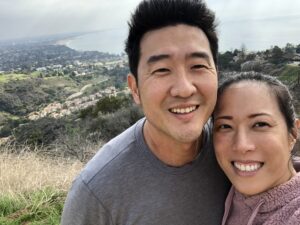 Tae continued to research non-stop and reached out to oncologists around the country and in Asia for what his next steps should be. He knew that systemic chemo often does not reach the peritoneum, so he needed to find treatment directed at the peritoneum. He decided to pursue serial HIPEC surgery every 5-6 weeks while continuing his systemic chemo to keep the cancer in his stomach controlled. As this was not a standard-of-care treatment for gastric cancer, he used his research and persuasiveness to obtain approval from his insurance company and medical team. He had his first HIPEC surgery in late June. His plan was to do serial HIPEC for the next few months until he could get PIPAC through a clinical trial at City of Hope.
Tae continued to research non-stop and reached out to oncologists around the country and in Asia for what his next steps should be. He knew that systemic chemo often does not reach the peritoneum, so he needed to find treatment directed at the peritoneum. He decided to pursue serial HIPEC surgery every 5-6 weeks while continuing his systemic chemo to keep the cancer in his stomach controlled. As this was not a standard-of-care treatment for gastric cancer, he used his research and persuasiveness to obtain approval from his insurance company and medical team. He had his first HIPEC surgery in late June. His plan was to do serial HIPEC for the next few months until he could get PIPAC through a clinical trial at City of Hope.
Receiving Good News
During this time he also switched his systemic chemo to the next line, FOLFIRI. He also continued Herceptin and Keytruda. Tae had about 4 rounds of HIPEC between June and September. The serial HIPEC was working to control the cancer in his peritoneum. By the last round, all 4 of the biopsies came back negative for cancer. He was scheduled to get his first PIPAC treatment at the end of October. However, when the surgeons looked inside during surgery, they no longer saw any cancer in his peritoneum. He was not given any treatment (as clinical trials require evidence of disease).
We were amazed to hear this. Even though it didn’t necessarily mean the cancer was completely gone in his peritoneum, having no visible cancer was great news. Tae’s doctors were astounded by the improvement as well. His success opened the door for other gastric cancer patients after him to be able to get serial HIPEC at his hospital. Tae’s plan was then to get another HIPEC surgery in 5 weeks. If there was still no visible cancer, he was told that he would be a candidate for curative surgery to remove his stomach.
Obstacles to Receiving Curative Surgery for Stage 4 Stomach Cancer
However, at the next HIPEC surgery the day before Thanksgiving, we learned that the cancer had spread all over the peritoneum again. This was beyond devastating news to us. We went from thinking there was hope for curative surgery to being back at square one in a month. His health had also taken a major downturn by this time. The ulcerative colitis and compounded side effects of all the chemo were taking their toll.
In December, Tae switched his chemo from FOLFIRI, Herceptin and Keytruda to just paclitaxel, due to all the side effects and disease progression. Tae still pushed himself to stay active and exercise when possible. He kept his fighting spirit despite the pain and discomfort.
No Longer a Candidate for HIPEC
Unfortunately, at his next scheduled HIPEC in January 2021, his surgeon found that he had so many adhesions that HIPEC was aborted. He was told that he could no longer have any treatments in the peritoneum. Again, a major setback.
In February, he had a colonoscopy which showed severe inflammation in his colon. His CT scan showed a partial small bowel obstruction due to his cancer spreading. He had an NG tube inserted and had to get on TPN (IV nutrition) as he was no longer able to eat. His chemo was changed again to cisplatin.
During February through April of 2021, things went progressively downhill. Tae was hospitalized several times due to painful bowel blockages, multiple infections, and then had a fistula which required an ostomy bag from his abdomen. He needed the NG tube inserted again and he had lost over 50 pounds. His surgeon said that given all the complications that had happened, it was a miracle that he was still alive. At this point, Tae was also out of treatment options. He had no other chemo lines that he hadn’t already tried.
The CAR-T Clinical Trial
In May 2021, Tae learned about a new phase 1 CAR-T clinical trial through Facebook. This trial targeted the CLDN18.2 protein. The trial had shown very promising, if not unprecedented positive results for gastric cancer in China. If he was accepted, he would be the first gastric cancer patient in the US to receive CAR-T on this trial. He tested positive for CLDN18.2. Tae thankfully took his place as Patient #1 in the trial at UC San Diego.
In June, he underwent leukapheresis. This procedure draws blood and separates the white blood cells. In July, he received his injection of the re-engineered T-cells after 3 days of chemo to reduce his white blood cells. He was hospitalized for a week and had some side effects of fever and nausea. But after the initial side effects, his condition quickly started to improve. He was able to remove his NG tube, indicating the treatment was opening up his blockages. He felt stronger, and his pain had decreased. His CT scan showed an exceptional response to treatment.
Unlike chemo, which typically causes debilitating side effects every 1-2 weeks, CAR-T is a one-time injection. Tae’s body got stronger with each day after the injection. He “came back to life” during this time. Tae was able to do so many things that he couldn’t do since diagnosis. We went on family trips to the mountains. He took the boys to amusement parks and museums on his own, taught them fishing, walked our older son to school, and cooked delicious meals for me and the boys (though he still couldn’t eat). And of course, he shared his success with the stomach cancer community, and many of them also pursued the CAR-T trial because of him.
Short-lived Improvements
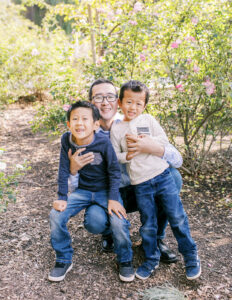 Unfortunately, the duration of the response lasted only about 2-3 months. His CT scan in September showed that his stomach cancer was stable. But there was an increase in his ctDNA report, indicating that the cancer was starting to grow again.
Unfortunately, the duration of the response lasted only about 2-3 months. His CT scan in September showed that his stomach cancer was stable. But there was an increase in his ctDNA report, indicating that the cancer was starting to grow again.
In late October, he went through the whole process again. Tae received his 2nd dose of CAR-T. He again showed a very good response to the treatment, which allowed him to make many memories with me and the boys during the Thanksgiving and Christmas holidays. At the end of January 2022, his ctDNA again showed an increase. He started the process with UCSD to get the next dose of CAR-T.
Unfortunately, the hospital and trial had to approve a 3rd dose. This delayed the process until April. By the time he was eligible, his health had considerably declined due to the cancer spreading again. Tae’s response to the 3rd treatment was shorter lived.
In the next few months, Tae got progressively sicker with increased pain and complications from the cancer. However, he still had hope for another CAR-T treatment, even if it showed less efficacy than before. When he found out that another CAR-T treatment would take too long, he started looking at other clinical trials and treatments. He kept his determination and incredible fighting spirit until the very end of his journey. He never gave up hope. Tae passed away in September of 2022 from complications of his cancer, 2 years and 9 months after diagnosis and 3 weeks before he turned 41.
Q: I am so sorry to hear about your loss. Tae’s life and journey are an inspiration to anyone facing stomach cancer. Do you have any advice or final thoughts that you’d like to share?
A: My advice based on Tae’s experience is to advocate for yourself and do your own research. Given the limited standard of care options for stomach cancer and poor prognosis, Tae knew he had to take charge of his treatment decisions and look beyond what was offered to him. Tae paved his own treatment path for his cancer from the very beginning of his diagnosis and was a pioneer in many ways. From replicating a promising clinical trial for his first-line treatment (which later became standard of care for HER2+ and PD-1 patients), serial HIPEC, to CAR-T, all his treatment decisions were based on his own research. He made calculated decisions with help from a team of doctors that he consulted with. He pushed his medical team to think outside the box and opened new paths for patients after him.
Even while Tae’s treatments were working, he was researching what his next steps should be. He chose a supportive and extremely responsive team of doctors at City of Hope. He knew he could rely on them and they were top experts in their field. We always felt like he was in the best hands and knew that his team was integral to his long survival.
I believe hope and a positive mindset make a huge difference in a cancer fight. One of Tae’s doctors said that he fought harder and had the strongest will to live than any patient they’d encountered. I know that Tae’s positivity and his will to live helped him survive much longer than the initial 12-month prognosis given to him. At the beginning of his cancer journey, Tae had said to his supporters “There’s no limit to what I’ll do to be the exception and live for a long time for my family.” He lived up to what he said.
Hope for the Future
One of my hopes for the future is for high-risk populations like Tae to get regular screenings for stomach cancer, regardless of age. If Tae or his primary care doctor had known that his risk for stomach cancer as a Korean American was 10x higher, he could have gotten an early endoscopy before his symptoms started or at the first sign of symptoms. This could have prolonged, if not saved, his life.
My hope is that by the time my two sons (who are also high-risk) are adults, this will be a reality, so that there is no chance for them to be surprised by a late-stage diagnosis like their father was. I also hope that there will be more clinical trial options and advancements in stomach cancer treatment. Though the CAR-T trial was not the miracle cure for Tae that we’d hoped for, it gave him an extra year of life. He was able to watch his boys grow and make memories together. I know that his role in that trial will save or extend the lives of other stomach cancer patients in the future. I hope that CAR-T and other new treatments will give more options to those who are fighting this aggressive cancer.
Ultimately, I hope for a cure, so that no more lives are cut short, like Tae’s was, due to stomach cancer.
